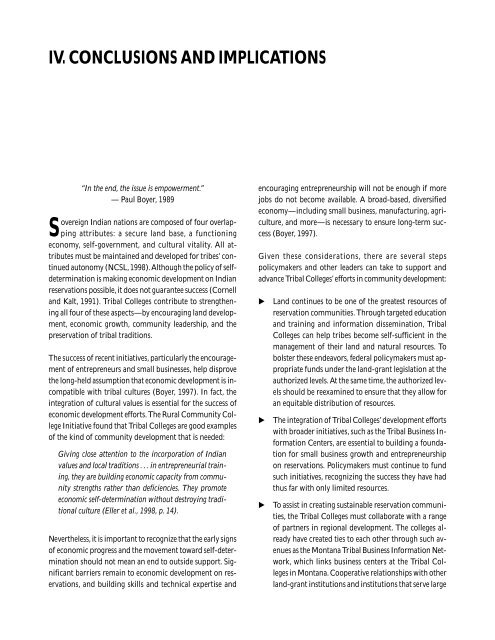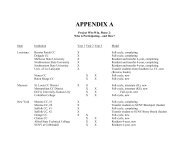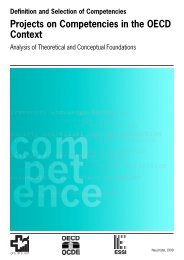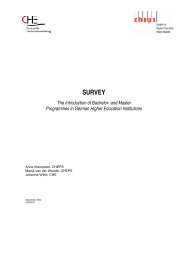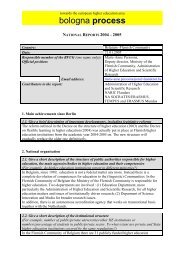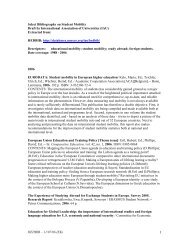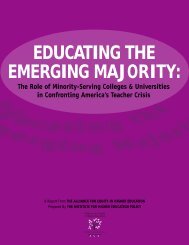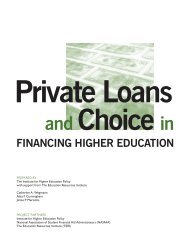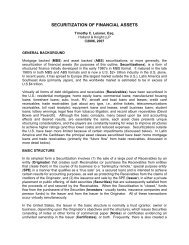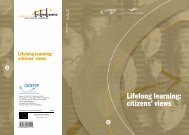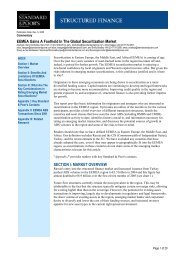Tribal College Contributions to Local Economic Development
Tribal College Contributions to Local Economic Development
Tribal College Contributions to Local Economic Development
- No tags were found...
Create successful ePaper yourself
Turn your PDF publications into a flip-book with our unique Google optimized e-Paper software.
IV. CONCLUSIONS AND IMPLICATIONS“In the end, the issue is empowerment.”— Paul Boyer, 1989Sovereign Indian nations are composed of four overlappingattributes: a secure land base, a functioningeconomy, self-government, and cultural vitality. All attributesmust be maintained and developed for tribes’ continuedau<strong>to</strong>nomy (NCSL, 1998). Although the policy of selfdeterminationis making economic development on Indianreservations possible, it does not guarantee success (Cornelland Kalt, 1991). <strong>Tribal</strong> <strong>College</strong>s contribute <strong>to</strong> strengtheningall four of these aspects—by encouraging land development,economic growth, community leadership, and thepreservation of tribal traditions.The success of recent initiatives, particularly the encouragemen<strong>to</strong>f entrepreneurs and small businesses, help disprovethe long-held assumption that economic development is incompatiblewith tribal cultures (Boyer, 1997). In fact, theintegration of cultural values is essential for the success ofeconomic development efforts. The Rural Community <strong>College</strong>Initiative found that <strong>Tribal</strong> <strong>College</strong>s are good examplesof the kind of community development that is needed:Giving close attention <strong>to</strong> the incorporation of Indianvalues and local traditions . . . in entrepreneurial training,they are building economic capacity from communitystrengths rather than deficiencies. They promoteeconomic self-determination without destroying traditionalculture (Eller et al., 1998, p. 14).Nevertheless, it is important <strong>to</strong> recognize that the early signsof economic progress and the movement <strong>to</strong>ward self-determinationshould not mean an end <strong>to</strong> outside support. Significantbarriers remain <strong>to</strong> economic development on reservations,and building skills and technical expertise andencouraging entrepreneurship will not be enough if morejobs do not become available. A broad-based, diversifiedeconomy—including small business, manufacturing, agriculture,and more—is necessary <strong>to</strong> ensure long-term success(Boyer, 1997).Given these considerations, there are several stepspolicymakers and other leaders can take <strong>to</strong> support andadvance <strong>Tribal</strong> <strong>College</strong>s’ efforts in community development:Land continues <strong>to</strong> be one of the greatest resources ofreservation communities. Through targeted educationand training and information dissemination, <strong>Tribal</strong><strong>College</strong>s can help tribes become self-sufficient in themanagement of their land and natural resources. Tobolster these endeavors, federal policymakers must appropriatefunds under the land-grant legislation at theauthorized levels. At the same time, the authorized levelsshould be reexamined <strong>to</strong> ensure that they allow foran equitable distribution of resources.The integration of <strong>Tribal</strong> <strong>College</strong>s’ development effortswith broader initiatives, such as the <strong>Tribal</strong> Business InformationCenters, are essential <strong>to</strong> building a foundationfor small business growth and entrepreneurshipon reservations. Policymakers must continue <strong>to</strong> fundsuch initiatives, recognizing the success they have hadthus far with only limited resources.To assist in creating sustainable reservation communities,the <strong>Tribal</strong> <strong>College</strong>s must collaborate with a rangeof partners in regional development. The colleges alreadyhave created ties <strong>to</strong> each other through such avenuesas the Montana <strong>Tribal</strong> Business Information Network,which links business centers at the <strong>Tribal</strong> <strong>College</strong>sin Montana. Cooperative relationships with otherland-grant institutions and institutions that serve large


